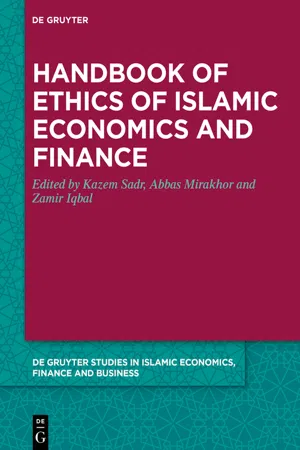
Handbook of Ethics of Islamic Economics and Finance
- 648 pages
- English
- PDF
- Available on iOS & Android
Handbook of Ethics of Islamic Economics and Finance
About This Book
Since the financial crisis of 2007/2008, a renewed discussion on the ethics and finance is being examined from different dimensions – finance for good society, responsible finance, ethical finance, financial crimes, and financial repression. The principal objective of this Handbook on Ethics of Islamic Economics and Finance is to provide a deeper understanding of the ethical underpinning of Islamic economics and finance.
The reader will notice that the Handbook reflects a diversity of views on the subject of economic and business ethics in Islam across the intellectual spectrum of Muslim thought over the globe. Handbook attempts to find answers to some questions concerning the definition and characteristics of the ethical system in Islam. What is its goal and how do its rules and practices ensure welfare for individuals and society? Are the moral principles universal and invariable or do they change and adapt with the social changes of communities and progress in science and technology? Is the present generation accountable for the welfare of future generations? Where is the boundary between law and ethics and who guarantees their adoption and implementation?
Frequently asked questions
Information
Table of contents
- Preface
- Introduction
- Contents
- Chapter 1: Ethics of Risk-Sharing Economics and Finance
- Chapter 2: Ethics in the Light of Maqasid Al-Shari’ah: A Case Study of Islamic Economics and Finance
- Chapter 3: The Status of Economic Operations and Business Ethics in the Historical Mindset of Muslim Scholars
- Chapter 4: The Central Role of Spirituality and Ethics in Islamic Economics and Finance
- Chapter 5: The Role of Spirituality and Morality in the Islamic Model of Economic Education and Training
- Chapter 6: Sustainable Human Development Ethics: A Quranic Perspective
- Chapter 7: Relationship Between Ethics and Economic Development from the Viewpoint of the Qur’an and Hadith
- Chapter 8: The Environmental Crisis in the Islamic World – Pertinence of the Teachings of Traditional Islam
- Chapter 9: Responsibility of Muslims versus Environment
- Chapter 10: Business Ethics
- Chapter 11: Ethical Model of Business Ethics: Qur’an’s View
- Chapter 12: Spiritual Excellence (Iḥsān) for Professionals: A Ḥadīth-Based Perspective
- Chapter 13: Human and Role of Ethics in His Interactions in Makarim-ul-Akhlaq Prayer by Ali bin Hussain (PBUH)
- Chapter 14: Shaheed Sadr’s Perspective on Property Rights in Islam
- Chapter 15: Significance of “Trust” in Capital Formation in Islamic Finance
- Chapter 16: Principle of Human Dignity: The Criteria for Ethical Assessment of Business Relations in Islamic Economy
- Chapter 17: Domains of Probity (“Sidaqat”) in Islamic Markets
- Chapter 18: An Index of Islamic Market Probity (“Sidaqat”)
- Chapter 19: Fair Wages in Islam
- Chapter 20: Ethics and the Acknowledged Right of the Destitute in the Qur’an and Hadith
- Chapter 21: Influence of Piety (Taqwa) on Ethical Decision-makings in Business: Integration of Religious and Scientific Views
- Chapter 22: The Role of Religious and Ethical Teachings in Designing Social Welfare Function
- Chapter 23: Towards an Integrative Framework for Understanding Producer Behaviour in Islamic Economics Framework
- Chapter 24: The Ethics of Consumption in Islam
- Chapter 25: A Glance at the Ethical Dimensions of Money in Islamic Economic System
- Chapter 26: Hoarding of Goods, Money and Financial Assets
- Chapter 27: Ethics and Economy of Islamic Government
- Chapter 28: Principles of Defining Public Domain in Islam in Contrast to Neoclassical and Communitarian Viewpoints
- List of Figures
- List of Tables
- Contributing Authors’ Short Bios
- Index